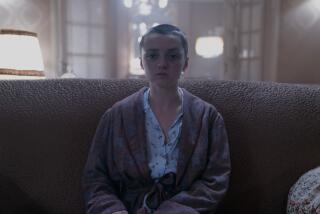Movie review: ‘What Maisie Knew’ gives a child’s eye view of divorce
- Share via
It is night in an upscale Manhattan apartment. A child, tucked safely into bed, drifts toward sleep to the sounds of her parents tearing each other apart in the next room. Her eyes close, the fighting rumbles on, their words wielded with lethal precision at each other’s most vulnerable spots.
We are in Maisie’s world and about to find out in uncomfortable detail just “What Maisie Knew.”
Directors Scott McGehee and David Siegel have created a smart — and smarting — film based on the novel “What Maisie Knew,” one of Henry James’ lesser-known works. Without losing the 19th century author’s sensibility, screenwriters Carroll Cartwright and Nancy Doyne have brought into the modern age James’ unforgiving examination of the effect of a messy divorce on a child.
For all the ugliness the topic suggests — and there is plenty provided by Julianne Moore and Steve Coogan as vengeful exes — this is a beautifully rendered film. The many provocations of James’ observations are handled without slipping into melodrama as we watch the precocious 6-year-old witness and weather the breakup of her family.
The truths the filmmakers are out to expose can be difficult watching. What goes a long way to making this cautionary tale worth the angst is the incandescent Onata Aprile in her big-screen debut as Maisie. The youngster is remarkable at telegraphing a rainbow of emotions, often commanding the screen in silence, with nothing more than those soulful and surprisingly knowing eyes absorbing and assessing the mess her parents have made.
Still, it was a risky gambit to let us see the world only from Maisie’s vantage. Working again with an excellent Giles Nuttgens as director of photography, the filmmakers make Maisie’s world feel organic, never forced. There is even a little fable-like quality — in kites and coloring, but also in bars and bedrooms — to soften some of the harsh reality.
Maisie’s badly behaving parents are Susanna (Moore) and Beale (Coogan). We do not see them in better times, but already engaged in a brutal war of egos played out in the culturally elite world of a fading rock diva and an under-pressure contemporary art dealer.
The child is the center and the outsider in this collapsing universe. She may only be 6, but she has already learned to read the tensions far better than the storybooks that Margo (Joanna Vanderham), her nanny, always has close at hand. It’s not that Susanna and Beale don’t love Maisie; they do. But these narcissists have no idea how to nurture a child. Each is equally desperate in competing for her love. More significantly, Maisie becomes their emotional arsenal; she is necessary to keep the war raging.
The choice of where she will live and whom she will love most provides the movie’s ebb and flow. Susanna and Beale separate, divorce and remarry in a flash. The custody arrangement takes Maisie into a confusing world of stepparents and shifting households. It begins to inform her understanding of how a family should work, and how proper parents should behave.
The first tectonic shift comes soon after Beale moves out and weds Maisie’s much-adored nanny. Margo is blond, lovely, much younger and much kinder than Susanna. Easy for Maisie to adore, easier for Susanna to hate.
In reaction, Susanna tries to reenergize her career and, in keeping with the rock-star image, marries a much younger man, an attractive bartender named Lincoln (Alexander Skarsgard). A decent guy, Lincoln quickly finds himself the primary caretaker for the young girl. In one particularly telling scene, Susanna lashes into him for letting Maisie love him. Skarsgard gives his unassuming bartender a kind of tenderheartedness that is as touching as Maisie’s plight.
Like a playground seesaw, the film keeps tottering between which parent is worse and which stepparent is better. Tough lessons for the child come at every turn. That Maisie finds a way to navigate the turmoil is not offered up to mitigate parental wrongs but, rather, to remind what a quick study kids are.
“What Maisie Knew” is the directors’ most ambitious cut at family crises — 2001’s “The Deep End” stands as their best work until now. Their restraint in handling the emotional roller coaster saves the movie from maudlin. Indeed the film’s strength is in its understatement.
Moore, whose talent for portraying edgy women has earned her four Oscar nominations thus far, goes more strident than ever to create a monster of a mother. Susanna’s temper is explosive, and her need for love is as unquenchable as her desire for fame. Yet in rare moments when her eyes well in pain rather than rage, Moore lets us see her vulnerability too.
Coogan’s trajectory is different but as carefully crafted. At first Beale seems little more than another long-suffering partner of an artistic type (read: mercurial). But Beale soon becomes as insufferable as his ex, and Coogan, better known for his dry wit, proves adept at making the transition ring true.
The movie has something to say about class as well. The notion that a child will be more loved and better cared for by those lower on the economic ladder would have weakened the film if that were the sum total of Lincoln and Margo’s character. Instead, in Skarsgard and Vanderham’s hands, they become the sort of decent people you want to color a child’s life. What makes the film unexpectedly hopeful is that Maisie understands that too.
--
‘What Maisie Knew’
MPAA rating: R for some language
Running time: 1 hour, 38 minutes
Playing: Landmark Theatre, West Los Angeles
More to Read
Only good movies
Get the Indie Focus newsletter, Mark Olsen's weekly guide to the world of cinema.
You may occasionally receive promotional content from the Los Angeles Times.










